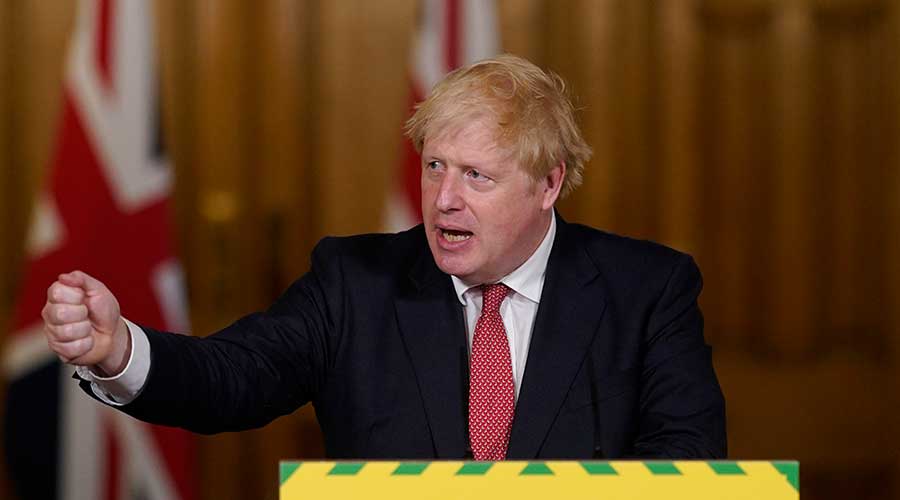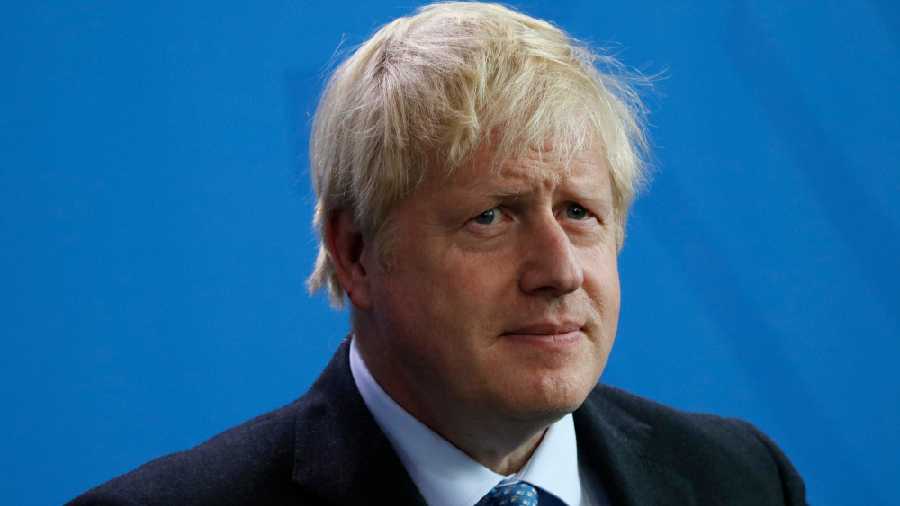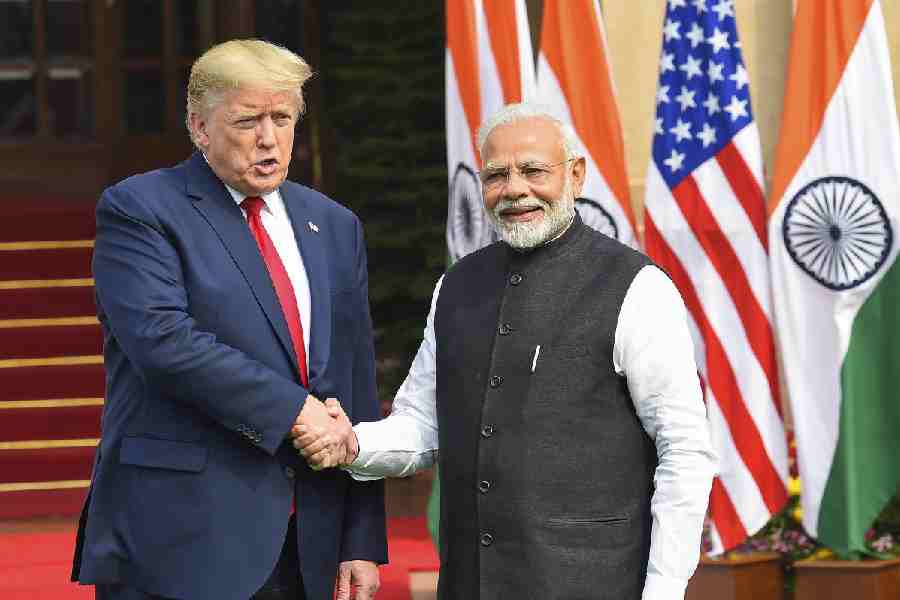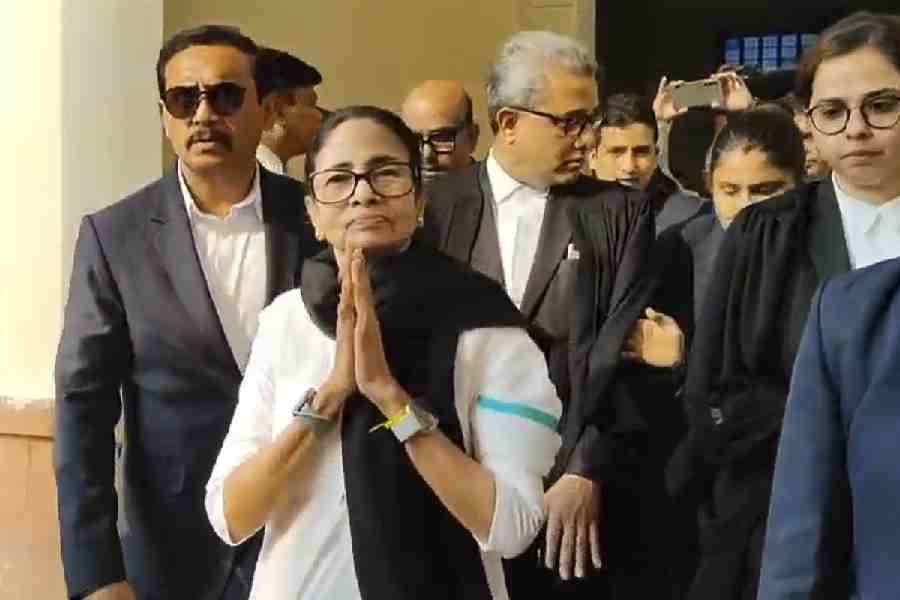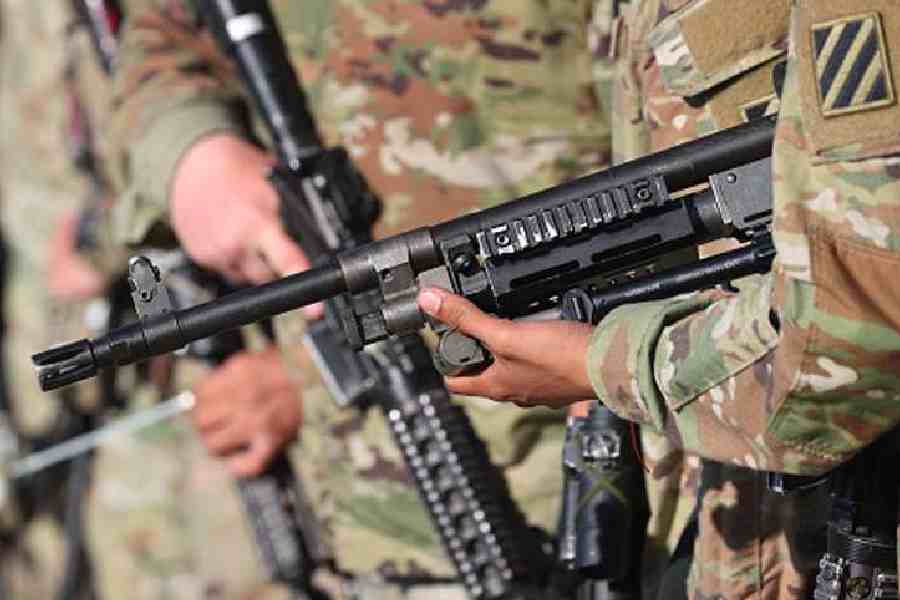British Prime Minister Boris Johnson Thursday announced his resignation as Conservative Party leader after he was abandoned by his close allies in the wake of a series of scandals that rocked his government, triggering a leadership election for a new Tory leader who will go on to become his successor.
Johnson, 58, said he will remain in charge at 10 Downing Street until the process of electing a new leader is completed - expected by the time of the Conservative Party conference scheduled for October.
He blamed the "herd instinct" of his party as he delivered his resignation speech on the doorstep of 10 Downing Street and expressed his sadness at giving up the "best job in the world."
"I want you to know how sad I am to be giving up the best job in the world," Johnson said in his speech, marking an end to his three tumultuous years in power.
"It is clearly now the will of the parliamentary Conservative Party that there should be a new leader of that party and therefore a new Prime Minister, said Johnson, showing very little emotion as he read out his speech which lasted just over six minutes.
"I have agreed with Sir Graham Brady, the chairman of our backbench MPs that the process of choosing that new leader should begin now and the timetable will be announced next week and I have today appointed a Cabinet to serve as I will until a new leader is in place," he said.
The outgoing leader reiterated his "incredible mandate" at the 2019 general election, which was "the reason I have fought so hard in the last few days to continue to deliver that mandate in person".
"I felt it was my job, my duty, my obligation to you to continue to do what we promised in 2019," he said.
Referring to the high drama of the last few days, Johnson said he had tried to persuade his colleagues that it would be eccentric to change governments with such a vast mandate and when the Tories are only a handful of points behind in the polls and when the economic scene is so difficult domestically and internationally.
He also highlighted some of his government's achievements, including the fastest rollout in Europe of COVID vaccines.
He added: "I regret not to have been successful in those arguments and of course it is painful not to be able to see through so many ideas and projects myself.
"As we have seen at Westminster, the herd instinct is powerful and when the herd moves, it moves and my friends in politics no one is remotely indispensable and our brilliant Darwinian system will produce another leader, equally committed to taking this country forward through tough times."
The move was resoundingly welcomed in the Opposition ranks and a large chunk of his own party, with Labour Leader Keir Starmer declaring the resignation good news for the country .
Many Conservative MPs, however, are critical of Johnson's plan to continue in office for another few months until a new leader is in place after his authority is so clearly bruised and battered by his own former supporters.
But Johnson remains defiant even in apparent defeat and went ahead with appointing a series of replacement Cabinet ministers to fill in the posts left vacant by angry former ministers, including Indian-origin Tory MP Shailesh Vara as the new Northern Ireland Secretary.
The resignation decision finally came after days of intense political frenzy and a steady stream of exits from within the UK Cabinet since Tuesday and just minutes after Johnson's newly appointed Chancellor to replace Rishi Sunak wrote a scathing public letter calling for him to go now .
Nadhim Zahawi, the Iraqi-origin minister among the frontrunners to replace Johnson in 10 Downing Street, wrote: "Prime minister, you know in your heart what the right thing to do is, and go now."
His demand followed over 50 resignations since Johnson's apology on Tuesday, after days of changing messages from Downing Street over the hiring and handling of the now-suspended Chris Pincher, who quit as Deputy Chief Whip in charge of Tory party discipline last week after admitting drunken misconduct. It comes in the wake of the partygate scandal of COVID law-breaking parties in Downing Street, which had resulted in a no-confidence vote last month which Johnson just about survived.
His resignation will now trigger a fierce leadership battle within the Conservative Party, with MPs in the process of putting themselves forward for the race.
Goan-origin UK Attorney General Suella Braverman, who chose not to resign from Cabinet saying her legal role made it incumbent upon her to carry on, had withdrawn her support from Johnson and is among the first MPs to stake a claim to contest the leadership election.
Others expected to join the race include Zahawi and Foreign Secretary Liz Truss, with former Chancellor Rishi Sunak and former Health Secretary Sajid Javid among some of the others seen as likely contenders.
Indian-origin Home Secretary Priti Patel is also among the names touted along with UK Defence Secretary Ben Wallace. Among the more junior members, Tory MPs Penny Mordaunt, Tom Tugendhat and former Foreign Secretary Jeremy Hunt are the names doing the rounds.
Johnson's term as British Prime Minister will be remembered for setting the India-UK relations on the course of a "Comprehensive Strategic Partnership".
Widely seen as an enthusiastic cheerleader for closer ties with India, Johnson had a palpably close bond with Prime Minister Narendra Modi - someone he would often refer to as his special friend or "khaas dost".
Process of electing new leader
Reuters: Below is how a process to find Johnson's successor will work:
Candidates putting themselves forward for the leadership, and there could be many, must be nominated by two other Conservative lawmakers.
Conservative lawmakers then hold several rounds of votes to whittle down the field. Each time they are asked to vote for their favoured candidate in a secret ballot, and the person with the fewest votes is eliminated.
This process is repeated until there are two candidates remaining. Votes previously have been held every Tuesday and Thursday but parliament is due to break for its six-week summer recess on July 21 so the process may have to be accelerated.
The final two candidates are then put to a postal ballot of the wider Conservative Party membership, with the winner named the new leader.
The leader of the party with a majority in the House of Commons is the de facto prime minister. He or she does not have to call a snap election, but has the power to do so.
HOW LONG WILL IT ALL TAKE?
The duration of the leadership contest can vary, depending on how many people put themselves forward. Theresa May became leader less than three weeks after David Cameron resigned in 2016 and all other contenders dropped out mid-race.
Johnson faced former health minister Jeremy Hunt in the run-off ballot of Conservative members to replace May in 2019, and took office two months after May announced her intention to resign. Speaking outside Downing Street, Johnson said he would remain in office until a new prime minister is elected, but some Conservative members of parliament want Johnson to be replaced immediately.

